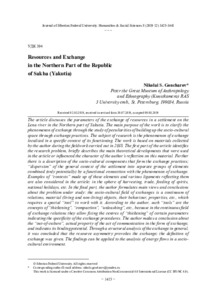Показать сокращенную информацию
Resources and Exchange in the Northern Part of the Republic of Sakha (Yakutia)
| Автор | Goncharov, Nikolai S. | en |
| Автор | Гончаров, Н. С. | ru_RU |
| Дата внесения | 2019-08-30T03:17:31Z | |
| Дата, когда ресурс стал доступен | 2019-08-30T03:17:31Z | |
| Дата публикации | 2019-08 | |
| URI (для ссылок/цитирований) | https://elib.sfu-kras.ru/handle/2311/112620 | |
| Аннотация | The article discusses the parameters of the exchange of resources in a settlement on the Lena river in the Northern part of Yakutia. The main purpose of the work is to clarify the phenomenon of exchange through the study of peculiarities of building up the socio-cultural space through exchange practices. The subject of research is the phenomenon of exchange localized in a specific context of its functioning. The work is based on materials collected by the author during the fieldwork carried out in 2018. The first part of the article identifies the research problem, briefly describes the main theoretical developments that were used in the article or influenced the character of the author’s reflection on this material. Further there is a description of the socio-cultural components that form the exchange practices; “dispersion” of the general context of the settlement into separate groups of elements combined (only potentially) by a functional connection with the phenomenon of exchange. Examples of “contexts” made up of these elements and various ligaments reflecting them are also considered in the article: in the sphere of harvesting, trade, feeding of spirits, national holidays, etc. In the final part, the author formulates main views and conclusions about the problem under study: the socio-cultural field of exchanges is a continuum of relations, material (living and non-living) objects, their behaviour, properties, etc., which requires a special “tool” to work with it. According to the author, such “tools” are the concepts of “thickening”, “compaction”, “unleashing”, etc., because in the continuous field of exchange relations they allow fixing the centres of “thickening” of certain parameters indicating the specificity of the exchange procedures. The author makes a conclusion about the “out-of-culture”, actual property of the act of communication in the form of exchange, and indicates its binding potential. Through a structural analysis of the exchange in general, it was concluded that the resource asymmetry provokes the exchange; the definition of exchange was given. The findings can be applied to the analysis of energy flows in a socio-cultural environment | en |
| Аннотация | В статье рассмотрены параметры обмена ресурсами в поселке на р. Лена в Северной части Якутии. Основная цель работы — это прояснение феномена обмена через исследование особенностей выстраивания социально-культурного пространства посредством обменных практик. В качестве предмета исследования выступает феномен обмена, локализованный в конкретном контексте его функционирования. Работа основана на материалах, собранных автором в ходе экспедиции 2018 г. В первой части статьи определяется проблема исследования, кратко описываются основные теоретические разработки, применяемые в статье либо оказавшие влияние на характер рефлексии автора по поводу данного материала. Далее следует описание социально-культурных компонентов, оформляющих обменные практики; произведено «рассеивание» общего контекста поселка на отдельные группы элементов, объединенные (лишь потенциально) функциональной связью с феноменом обмена. Также рассмотрены примеры «контекстов», складываемые из этих элементов и отражающие их различные связки: в сфере промыслов, торговли, кормления духов, народных праздников и др. В заключительной части формулируются основные взгляды и выводы автора по поводу исследуемой проблемы: социально-культурное поле обменов представляется континуумом отношений, материальных (живых и неживых) объектов, их поведением, свойствами и пр., что требует особого «инструмента» для работы с ним. Такими «инструментами», по мнению автора, выступают концепты «сгущения», «уплотнения», «развязывания» и т. п., поскольку в непрерывном поле отношений обмена они позволяют производить фиксации центров «сгущений» определенных параметров, указывающих на специфику обменных процедур. Сделан вывод о «внекультурном» актуальном свойстве акта коммуникации в форме обмена, обозначен его связывающий потенциал. Через структурный анализ обмена в общем виде сделан вывод о ресурсной асимметрии, провоцирующей обмен, дано определение обмену. Выводы могут быть применены к анализу энергетических потоков в социокультурной среде | ru_RU |
| Язык | en | en |
| Издатель | Сибирский федеральный университет. Siberian Federal University | en |
| Тема | exchange | en |
| Тема | socio-cultural space | en |
| Тема | thickening | en |
| Тема | fishing | en |
| Тема | crafts | en |
| Тема | context | en |
| Тема | trade | en |
| Тема | continuum | en |
| Тема | attractiveness | en |
| Название | Resources and Exchange in the Northern Part of the Republic of Sakha (Yakutia) | en |
| Альтернативное название | Ресурсы и обмен в Северной части Республики Саха (Якутия) | ru_RU |
| Тип | Journal Article | en |
| Контакты автора | Goncharov, Nikolai S.: Peter the Great Museum of Anthropology and Ethnography (Kunstkamera) RAS 3 University emb., St. Petersburg, 199034, Russia; nikola.gon4arov@yandex.ru | en |
| Контакты автора | Гончаров, Н. С.: Музей антропологии и этнографии им. Петра Великого РАН (Кунсткамера) Россия, 199034, Санкт-Петербург, Университетская наб., 3 | ru_RU |
| Страницы | 1425-1441 | ru_RU |
| DOI | 10.17516/1997–1370–0458 | |
| Журнал | Журнал Сибирского федерального университета. Гуманитарные науки. Journal of Siberian Federal University. Humanities & Social Sciences;2019 12 (8) | en |

